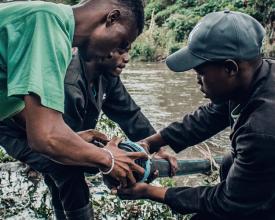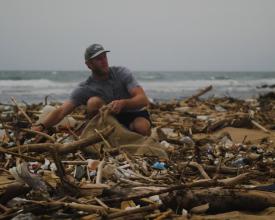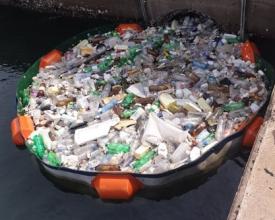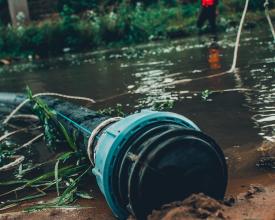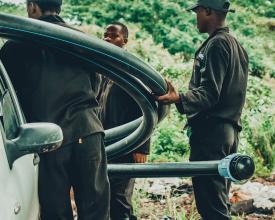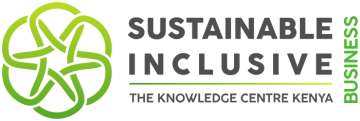
Proyecto Litterboom
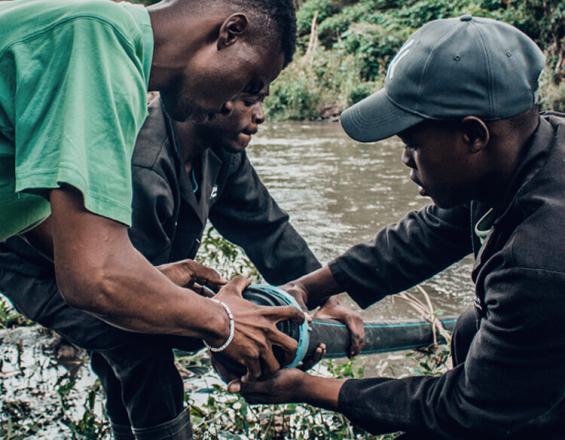
En Sudáfrica, casi el 90% de la contaminación marina por plásticos procede de sus propios sistemas fluviales.El Proyecto Litterboom (TLP) utiliza una gran tubería anclada en el río que actúa como colector de todos los plásticos de la superficie, principalmente HDPE y PET. Esta medida preventiva se instala estratégicamente donde puede recoger la mayor cantidad de basura y donde el equipo recoge, clasifica y envía el plástico a reciclar.
Contexto
Défis à relever
- Financiación inadecuada para garantizar que todos los ríos estén cubiertos con la barrera para atrapar plásticos.
- Gran cantidad de residuos no reciclables, como textiles, poliestireno y algunos envases de plástico sin valor comercial, que dificultan el desvío de la contaminación por plásticos que invade los vertederos.
- Los caprichos del tiempo a veces hacen que los ríos crezcan considerablemente, destruyendo así las barreras contra la basura ya instaladas.
- Insuficiente concienciación de las comunidades sobre cómo eliminar y gestionar los residuos plásticos en los hogares.
- Sólo atrapa el plástico que flota en la superficie.
- Las barreras y trampas no capturan microplásticos.
- Las barreras y trampas se sitúan al otro lado del río, por lo que pueden bloquear el tráfico dependiendo de la ubicación.
Ubicación
Procesar
Resumen del proceso
Las asociaciones y el desarrollo de infraestructuras han interactuado de forma dependiente para ampliar este proyecto a otras localidades de Sudáfrica, haciendo visibles sus repercusiones. Un proyecto iniciado por un hombre con el sueño de ver una playa limpia implicó a muchos socios que aportaron su experiencia para ampliar el uso de barreras para atrapar los residuos que fluyen por los ríos.
Bloques de construcción
Desarrollo de infraestructuras
Para evitar que los residuos plásticos lleguen a las playas y al medio marino, la inversión en barreras antibasura, trampas y otras soluciones tecnológicas es y sigue siendo una prioridad.
Factores facilitadores
Las barreras y trampas de basura funcionan eficazmente cuando el personal ha recibido formación sobre su instalación y mantenimiento, incluida la colaboración con las comunidades para gestionar los residuos en origen y evitar así la contaminación de los ríos.
Lección aprendida
- El mantenimiento de las infraestructuras está en el centro del desarrollo.
- La formación y la capacitación deben ser continuas.
- El compromiso de la comunidad debe estar en el centro de la gestión.
Asociaciones
Las asociaciones son fundamentales para ampliar una idea innovadora como Boom and Traps, así como para conseguir que el gobierno compre y desbloquee financiación para ampliarla.
Factores facilitadores
- Apertura y comunicación estratégica.
- Compromiso estratégico significativo.
Lección aprendida
- Las asociaciones deben evolucionar con el tiempo.
- Sea flexible y dé cabida a opiniones diversas.
- Compartir éxitos y fracasos forma parte de la colaboración.
Impactos
- Actualmente, TLP cuenta con más de 36 empleados dedicados a cinco de los sistemas fluviales más contaminados de Durban, que recogen más de 33.000 libras de plástico al mes.
- Las barreras de basura del Corredor Verde de Durban en la cuenca del río Umgeni son atendidas por recolectores de plásticos y los materiales recogidos se clasifican y venden a recicladores de plásticos.
- Una exitosa reunión sobre la contaminación del río Negro, celebrada el 24 de octubre de 2018, reunió a varios socios para compartir información y elaborar una estrategia sobre la contaminación del río, un plan de acción para 2019 que pone a TLP en vías de ampliación.
- TLP ha reducido en un 98% el presupuesto del Ayuntamiento para la limpieza de los ríos en Kwazulu Natal.
Beneficiarios
- Jóvenes debido a las oportunidades de empleo.
- Instalaciones de reciclaje y tratamiento de materiales.
- Gobiernos locales.
- Industrias hosteleras como resultado de la limpieza de las playas.
- Comunidades en general.
Objetivos de Desarrollo Sostenible
Historia
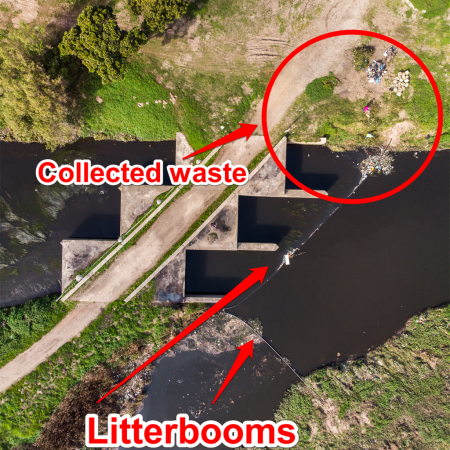
Una serie de innovadoras barreras flotantes para la basura plástica acaba de llegar a las vías fluviales de Ciudad del Cabo, lo que contribuirá en gran medida a recoger residuos que, de otro modo, se habrían dispersado en el océano o podrían resultar peligrosos para quienes viven en las riberas cercanas.
De momento, las barreras se han desplegado a lo largo del río Black, que puede desbordarse con toneladas de plástico cada año y desembocar en el mar en Paarden Eiland.
Las barreras están diseñadas para extenderse sobre la superficie del agua y atrapar los plásticos flotantes y otros residuos a medida que se desplazan río abajo.
Foto: Jay Caboz
Esta iniciativa forma parte de una asociación público-privada entre el Ayuntamiento de Ciudad del Cabo y dos ONG -The Litterboom Project (TLP) y Pristine Earth Collective- que están llevando a cabo una "RIVERLUTION" para limpiar los sistemas acuáticos de la ciudad.
"Creemos que esta primera prueba de concepto será un punto de partida para centrar nuestros esfuerzos en los sistemas de interceptación fluvial y revisar nuestra estructura de gestión de residuos en las zonas conflictivas", declaró Cameron Service, fundador de TLP.
Casi el 90% de la contaminación marina por plásticos de Sudáfrica procede de sus propios sistemas fluviales. Esto supone entre 15 000 y 40 000 toneladas de plástico marino al año, según una nueva investigación publicada por Carina Verster e Hindrik Bouwman en el South African Journal of Science en junio.
TLP es el primer programa de interceptación fluvial a gran escala de Sudáfrica. Comenzó en 2017 como un proyecto piloto de recogida de residuos en el río Umgeni, en Durban. Desde entonces, TLP se ha ramificado con más de 20 barreras a través de los sistemas fluviales de KwaZulu-Natal, retirando con éxito entre 700 kg y 1 tonelada de plástico cada día.
